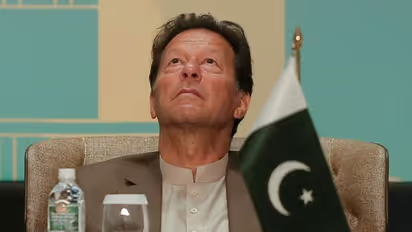Will reverse swing in fortunes cost Imran Khan his PM chair today?
The Opposition parties filed a no-confidence motion in the National Assembly in order to depose Imran Khan. The Imran Khan administration needs at least 172 votes in the 342-member National Assembly to survive the no-confidence motion.

The Pakistan National Assembly on Friday will convene for a key session, during which a no-confidence resolution against Imran Khan will be introduced. The no-confidence motion is included in a 15-point agenda for Friday's session released by the Secretariat on Thursday night.
Notably, on March 8, the Opposition parties filed a no-confidence motion in the National Assembly in order to depose Imran Khan. The Imran Khan administration needs at least 172 votes in the 342-member National Assembly to survive the no-confidence motion.
Imran Khan is Pakistan's 22nd Prime Minister and a former international cricketer. He was chancellor of the University of Bradford in the United Kingdom from 2005 to 2014, in addition to being the captain of the Pakistan national cricket team. Khan created the Pakistan Tehreek-e-Insaf in 1996 and currently serves as its chairman. In honour of his mother, he began a $25 million fundraising effort to establish a cancer hospital in Lahore.
His paternal family is Pashtun and belongs to the Niazi clan. He was born in Lahore. Khan grew raised in upper-middle-class surroundings with his four sisters. In England, he attended the Royal Grammar School Worcester, where he excelled in cricket. In 1972, he entered in Oxford's Keble College, where he studied Philosophy, Politics, and Economics, graduating in 1975.
Also Read: Imran Khan has 24 hours to quit; Pakistan opposition ready to topple him
As a cricketer:
Khan made his Test debut against England at Edgbaston in 1971. He returned to Pakistan in 1976 and earned a permanent spot on the national squad. Khan was a pioneer of the reverse swing bowling style in the late 1970s. He also holds the second-highest all-time batting average for a Test batsman playing at position 6 in the batting order, with 61.86.
Khan took over as captain of the Pakistan cricket team in 1982 and remained in charge until his retirement in 2005.
Also Read: Pakistan PM Imran Khan took Rs 5 lakh a month from sugar mogul to run his house?
Political journey:
On April 25, 1996, Khan founded Pakistan Tehreek-e-Insaf (PTI) and ran for the seat of National Assembly of Pakistan in the 1997 Pakistani general election as a PTI candidate from two constituencies – Mianwali and Lahore – but was unsuccessful, losing both seats to candidates of Pakistan Muslim League.
He ran in the Pakistani general election again in October 2002, and he was willing to create a coalition if his party did not receive a majority of the vote. From Mianwali, he was elected.
On October 30, 2011, Khan delivered a speech to nearly 100,000 supporters in Lahore, criticising the government's policies. In 2011, another successful public assembly of hundreds of thousands of supporters took place in Karachi. Since then, he has posed a serious challenge to Pakistan's ruling parties. Between 2011 and 2013, Khan and Nawaz Sharif became embroiled in a heated dispute.
Also Read | 3 reasons why Imran Khan lost Pakistan Army's trust and will lose PM's chair
Here's why Imran Khan lost favour with the Pakistan Army's senior leadership.
Appointment of ISI chief: Khan was still the Pakistan Army's blue-eyed youngster about a year ago. He was the military leadership's installation into power. It is worth noting that India and Pakistan gained independence at the same time in 1947, and that the Pakistan Army has administered the country for more than three decades.
The rift between Khan and Bajwa began in October of last year, when the prime minister refused to sign a paper relating to the nomination of a new ISI chief, Lt Gen Anjum. Khan did not want to replace Inter-Services Intelligence Director Lt Gen Faiz Hameed because of his close relationship with him. In 2017, Hameed was important in ousting Nawaz Sharief as Prime Minister.
Hardline against the West and the US: Despite this, several of Pakistan's senior generals are close to the US. It should be recalled that until recently, the United States and Pakistan were all-weather allies. Khan has recently developed an interest in Russia. In the recent two decades, he was the first Pakistani prime minister to travel to Moscow in February. In recent weeks, he has taken a more anti-Western tone, criticising the European Union in public demonstrations. Military commanders must understand that this might have major consequences for the country's economy and security.